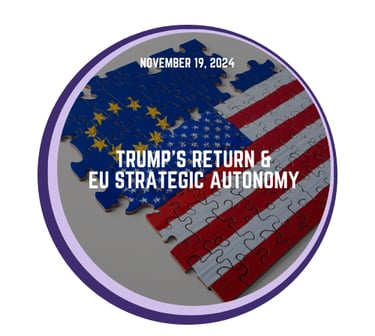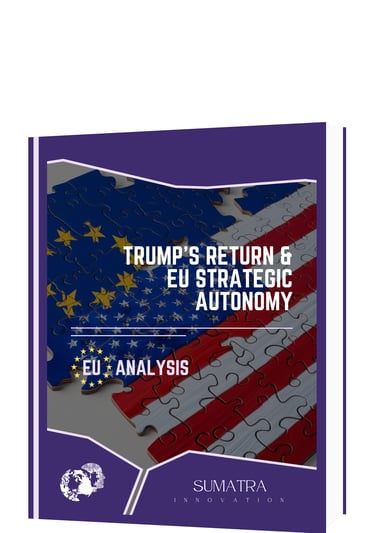The impact of the 2024 U.S. presidential election on EU strategic autonomy




The strategic autonomy of the European Union (EU-SA) became increasingly important for the European Union (EU) when the 2016 EU Global Strategy for Foreign and Security Policy emphasized the importance of Europe's autonomy of action and decision-making. Initially, European leaders recognized the need for the EU to act more autonomously and independently from non-EU countries, including key partners such as the United States (US; USA), in the areas of security and defense. Over the years, the EU-SA was then seen as a way to defend Europe's economic and political interests against Brexit (e.g. integrity of the single market, peace at the Irish borders), Trump's first presidency (e.g. climate action, multilateralism, NATO, trade), China's growth (e.g. trade and economic balance, human rights, technology), Covid-19 (e.g. economic recovery, supply chain resilience) or the war in Ukraine (e.g. energy security). Yet, the European Union's quest for strategic autonomy appears to be a difficult task given the geopolitical and globalized context of today's world, which makes it almost impossible to completely move away from dependency. Accordingly, a more realistic approach is to strengthen and create inevitable interdependencies with relevant and strategic actors, while reducing interdependencies imposed by invisible hands or directly by rivals. However, with the recent re-election of Republican Donald J. Trump on November 6, 2024, and his “America First” doctrine, friction and tensions could (re)emerge within the long-standing transatlantic alliance, due to the unpredictability and uncertainty surrounding his foreign policy. The US Congress is becoming increasingly polarized, with the Democrats moving ideologically to the left and the Republicans ideologically to the right, leading to different views on climate policy, strategic alliances such as NATO or defense spending. Furthermore - and both agree on this - China is the main rival of the United States, motivating the US to focus on the Indo-Pacific region and de-prioritize European interests.
The aim of this article is to understand the implications of the US presidential election results for the EU's pursuit of strategic autonomy, by answering the research question “How might Trump's return to the White House influence transatlantic cooperation in key sectors?”. First, the history of the transatlantic alliance will be summarized to provide a clearer understanding of the depth of the EU-US alliance and the reasons behind the EU's growing emphasis on strategic autonomy. The historical context establishes the foundations of mutual dependence, while more recent developments reveal the changing dynamics that are driving Europe to assert greater independence in the face of potential changes in US foreign policy. Secondly, the most relevant key areas of EU-US cooperation in recent decades will be covered. That includes security & defense, technology & digital cooperation, climate change & environmental policy, trade & economic policy, and foreign policy & diplomatic coordination. This will provide a basis to analyze the impact of Trump’s first term (2017-2021) on these sectors, which will then be contrasted with the current geopolitical landscape to predict the future impacts of Trump's return on the EU's strategic autonomy.



Executive Summary


The re-election of Donald Trump in 2024 marks a potential turning point in transatlantic relations, with major implications for the European Union's pursuit of strategic autonomy.
From post-WWII cooperation to Cold War alliances, the US has long been Europe's security and economic partner. However, Trump's first term exposed the EU's overreliance on the US in defense, trade, climate, and digital sovereignty.
Security & Defense: NATO commitments could weaken under Trump, prompting the EU to reinforce its own defense capabilities and industrial autonomy.
Technology & Digital Regulation: Diverging US-EU tech policies risk escalating tensions over AI, data privacy, and platform regulation.
Climate Policy: Trump’s fossil-fuel agenda and potential exit from the Paris Agreement would clash with the EU’s climate ambitions.
Trade & Economy: Tariffs and protectionist rhetoric could ignite a trade war, impacting EU industry, investment, and jobs.
Foreign Policy & Diplomacy: The EU may be forced to adopt a more independent and value-based foreign policy amid declining US multilateralism.
Trump’s second term presents a double-edged challenge; one that threatens cooperation but may also push the EU to consolidate its autonomy in defense, digital governance, global diplomacy, and green transition.




